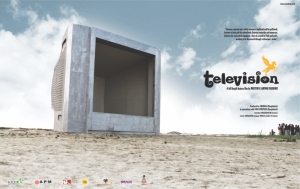| Home - Back Issues - The Team - Contact Us |
 |
| Volume 11 |Issue 37| September 21, 2012 | |
|
|
Cinema 'Television' in World Cinema Mostofa Sawar Farooki's fourth film 'Television' has been selected as the closing film of Asia's prestigious 17th Busan International Film Festival Tamanna Khan
While sceptics are about to write the obituary for Bangladeshi films, a group of young, talented film-makers is bringing home international appreciations by creating an revolution on their own. Mostofa Sarwar Farooki is one such fellow who is determined to revive and rejuvenate Bangladeshi cinema. A trend setter, according to Kim Ji Seok, Executive Programmer of Busan International Film Festival (BIFF), Farooki is already known in Bangladeshi drama-circle for his lively and rather realistic story-telling style. Now, he along with other young, aspirant film-makers of the country is about to give Bangladeshi cinema a separate place in the world map. In Farooki's language, “We are developing a new process of telling a story which is not a copy of Bollywood, or Kolkata's art film. We are developing our own style.” Kim Ji Seok in his video message, congratulating the success of Farooki's 'Television' for being chosen as the closing film of the upcoming BIFF, hinted the emergence of this trend. This rare honour to become the closing film in a prestigious film festival such as Busan-- held every year in Haeundae-gu, Busan (also Pusan), South Korea, since 1996--shows the importance that Bangladeshi cinema is gaining in the international arena. In fact the world premier of Farooki's last film 'Third Person Singular Number' also took place at Busan in 2009. Besides, 'Television', another film 'Container' by Bangladeshi film-maker Abu Shahed Emon, is also competing at the Wide Angle category of the BIFF this year. However, 'Television' has received international attention from the very beginning. Farooki informs that 'Television's' script was selected in two co-production markets — Asian Project Market, formerly known as Pusan Project Plan and Goa. Co-production markets are 3-5 day events held in the film festivals such as Rotterdam, Berlin, Busan and Goa, and bring together film professionals, directors, producers, distributors and sales agents, who are looking for high-quality international film projects, good business contacts and new initiatives for cooperation with other countries. “I met renowned producer and broadcaster Christof Thoke at the Asian Project Market and he showed willingness to co-produce,” he adds. The film has also received Asian Cinema Fund for Script Development and Post-Production and Goteberg Film Fund for script. Farooki received the inspiration of the story from one of his assistant directors, Asutosh Sujon. The film is named 'Television' for two reasons, explains Farooki. “One— television, the box, itself is a character in this film. The other reason is, we live in two worlds. One world is the real world. Another world is the imaginary world. We look at the television of the real world with open eyes. But the one in the imaginary world is seen by keeping the eyes closed. Whatever we see, keeping our eyes closed, whatever we imagine– based on these I wanted to find out if that imaginary world ever becomes big enough to surpass the real world. This is the study of this film.” Unlike its 112 minutes local version, which is likely to hit the cinema halls towards the end of November or early December, the international version is shorter in length and woven by one single theme– music, produced by the renowned Bangladeshi rock-star Ayub Bacchu. The 106-minute international version will be screened on October 13, at the closing day of the Busan International Film Festival. It is a satire based on Bangladeshi rural life which reflects the conflict between generations, father and son, boss and sub-ordinate, boyfriend and girlfriend, new and old. As the director says in the promo of the film, “There is a world of hide and seek waiting to be discovered through telescopic vision.”
|
||
Copyright
(R) thedailystar.net 2012 |
